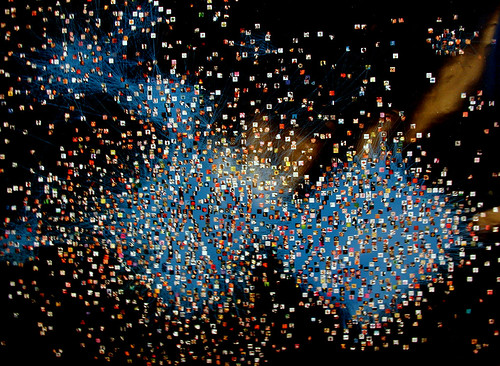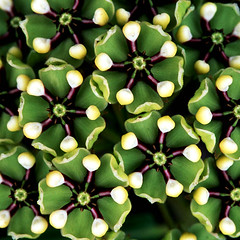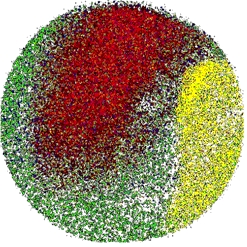You can't have small without the big
 Robert Scoble, in response to comments made by Evan Williams, creator of Twitter, at Web 2.0 asked the question: "why would anybody want a social network with only 10 friends? Seriously, don’t we already have this? It’s called a family." Williams was talking about creative constraints. Limiting the scope of a social network (TuDiabetes), or limiting the size of a message (Twitter/SMS). I'm surprised, frankly, that Scoble would make such an obtuse comment. That I have lots of friends isn't a reason to not use Facebook, and that my family exists says nothing about the modalities of communication I use to "groom" my relationships with them (to borrow a term from Robin Dunbar).
Robert Scoble, in response to comments made by Evan Williams, creator of Twitter, at Web 2.0 asked the question: "why would anybody want a social network with only 10 friends? Seriously, don’t we already have this? It’s called a family." Williams was talking about creative constraints. Limiting the scope of a social network (TuDiabetes), or limiting the size of a message (Twitter/SMS). I'm surprised, frankly, that Scoble would make such an obtuse comment. That I have lots of friends isn't a reason to not use Facebook, and that my family exists says nothing about the modalities of communication I use to "groom" my relationships with them (to borrow a term from Robin Dunbar).
TuDiabetes for example is a small network (recently passing 1100 enthusiastic users), constrained in scope to the issues related to living with Diabetes. That it is small and constrained makes it more valuable, not less.
 On the opposite end of the scale, The Economist recently published an article called "Social Graph-iti - There's less to Facebook and other social networks than meets the eye". I think it's intended to be a cautionary article about "irrational exuberance" in the social networking space, along the lines of the recent New York Times article. There's a lot that's right in the Economist's article, but I disagree with a few things. I think the author doesn't understand the nature of social networks in this respect: we can and do belong to many at one time (as we have since before there were "humans" at all). Many of our social networks, in fact, are built on top of other, existing networks. For example, the management team I work with at Kinzin is a small network built out of my larger "business associates" network, which is part of my "everybody I know" network. It overlaps with my "close friends network" and my "co-workers" network, and so forth.
On the opposite end of the scale, The Economist recently published an article called "Social Graph-iti - There's less to Facebook and other social networks than meets the eye". I think it's intended to be a cautionary article about "irrational exuberance" in the social networking space, along the lines of the recent New York Times article. There's a lot that's right in the Economist's article, but I disagree with a few things. I think the author doesn't understand the nature of social networks in this respect: we can and do belong to many at one time (as we have since before there were "humans" at all). Many of our social networks, in fact, are built on top of other, existing networks. For example, the management team I work with at Kinzin is a small network built out of my larger "business associates" network, which is part of my "everybody I know" network. It overlaps with my "close friends network" and my "co-workers" network, and so forth.
But unlike other networks, social networks lose value once they go beyond a certain size. “The value of a social network is defined not only by who's on it, but by who's excluded,” says Paul Saffo, a Silicon Valley forecaster. Despite their name, therefore, they do not benefit from the network effect.
 Mr. Saffo is both sucking and blowing, though, using "Social Network" to mean two things at the same time: the sum of all the users who are members of a particular social networking application, and all of the connections that each individual member has on that network.
Mr. Saffo is both sucking and blowing, though, using "Social Network" to mean two things at the same time: the sum of all the users who are members of a particular social networking application, and all of the connections that each individual member has on that network.
 My personal network doesn't scale for all the reasons that I've written about previously in my commentary on Dunbar's Number , but Facebook's network doesn't have the problem in the same way. It can contain every human in the world, and it doesn't lose value for me (at least not the same rate or in the same way), because I only need it to be able to find everyone in the world who potentially could be my contact, I don't need everyone to actually be my contact. It seems to me the Economist doesn't account for the fact that we all have multiple overlapping networks, containing people that in the end all are drawn from the same pool, namely all the humans in the world. If I'm trying to maintain 10 different social networks (friends, family, business, acquaintances, etc.), it's helpful to have the underlying system contain all the people in all the networks. So Facebook having 6B members helps me to better create the 10 person network that represents my geographically dispersed family.
My personal network doesn't scale for all the reasons that I've written about previously in my commentary on Dunbar's Number , but Facebook's network doesn't have the problem in the same way. It can contain every human in the world, and it doesn't lose value for me (at least not the same rate or in the same way), because I only need it to be able to find everyone in the world who potentially could be my contact, I don't need everyone to actually be my contact. It seems to me the Economist doesn't account for the fact that we all have multiple overlapping networks, containing people that in the end all are drawn from the same pool, namely all the humans in the world. If I'm trying to maintain 10 different social networks (friends, family, business, acquaintances, etc.), it's helpful to have the underlying system contain all the people in all the networks. So Facebook having 6B members helps me to better create the 10 person network that represents my geographically dispersed family.
Everyone's trying to make it simple: "Irrational Exuberance!", or "Everything's Really Different!" The reality, as it usually is with humans, is much more subtle.
Labels: community, culture, economist, facebook, family, family2.0, kinzin, ning, nyt, participation, Research, socialnetworking, web2.0, web2.1
 This post is Del.icio.us!
This post is Del.icio.us! Subscribe via RSS
Subscribe via RSS
